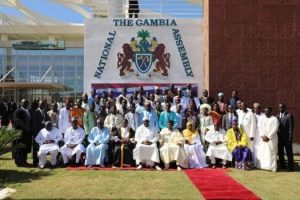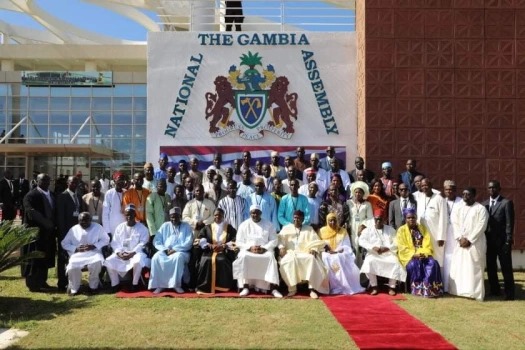 by Alagi Yorro Jallow.
by Alagi Yorro Jallow.
Fatoumatta: I have read the draft bill Restrictions on State of Public Emergency Powers Regulations,2020. The reading constrained me to conclude that it is a wise decision the members of the National Assembly on Thursday moved a motion for the Select Committee on Human Rights and Constitutional Matters of the hallowed chamber to scrutinize the motion on the extension of public emergency to three months.
Fatoumatta: The Gambia, a country in which we often attach a higher value to overblown insecure or personal egos of state officers than the rule of law and other matters of collective public interest. So we can expect many of the top government to order to wage clever but dishonest legal arguments in instead of engaging all stakeholders on the passing of the state of public emergency powers with (or a different measure altogether) that complies with the applicable legal, constitutional and public health standards.
Before the lawmakers, Attorney General, the Minister of Justice, Abubacarr Tambedou tabled a motion for National Assembly members to extend the State of Public Emergency powers to 3 months, effective 3rd April 2020. The declaration was made by President Barrow on Friday 27th March 2020, according to section 34(1) (a) of the 1997 constitution of the Gambia.
Fatoumatta: Justice Minister Tambadou said the declaration was made in response to the global threat of COVID-19, as declared by the World Health Organization (WHO) as a global pandemic, and the Gambia is vulnerable to the pandemic. He further told lawmakers that the ninety-day extension of the period of the state of public emergency would allow the government to make proper planning and organization for the implementation of the immediate, medium, and long term preventive and precautionary measures of the COVID-19 outbreak.
However, the bill of the state of public emergency powers and restrictions contain clear and far-reaching orders and directives that do not only suspend constitutionally guaranteed rights to liberty and freedom of movement but also shut down businesses and economic activities for 90 days, all in a bid to contain the spread of the deadly Coronavirus pandemic.
Fatoumatta: Under the provisions, the President, subject to the provisions of the Constitution, may by instrument published in the Official Gazette of the Government of issue a Proclamation of a state of public emergency powers in the country or any part thereof Section 34 of the 1997 Constitution. It has been contended that the President can only lawfully exercise public emergency powers regarding the enumerated situations, under Section 34 (2) of the Constitution if there is a proclamation to that effect and if there is a passage of a resolution of the National Assembly approving the proclamation and details of the emergency under Section 34(2) of the Constitution.
Furthermore, I am constrained to believe that the Attorney General and the Department of Justice did not seek legal advice before drafting and issuing; or ignored competent legal advice before drafting and issuing the draft State of public emergency powers; or received corrupt or sycophantic legal advice (a very likely possibility) before drafting and issuing the State of Public emergency powers before introducing the restriction and regulation bill before the National Assembly for approval.
The state of public emergency powers, for example, should only prohibit gatherings, processions, or movement’ between 7:00 p.m. and 5:00 a.m. It should not prohibit any person from being at any specific place between those hours. Furthermore, the state of the public emergency powers should not authorize the police or other members of the security forces to beat up anyone. The police can, of course, arrest and charge anyone who violates the state of the public emergency powers.
Fatoumatta: The Gambia government undoubtedly to prevent and protect Gambians from the deadly Coronavirus outbreak may impose drastic measures, including draconian measures and other restrictions on fundamental rights, to control the spread of the Coronavirus and other severe pandemics.
Fatoumatta: Why is the state of public emergency powers raise the constitutionality, legality, proportionality, and rationality of draconian measures that may have arisen concern but for the folly of police officers in their misguided colonial enthusiasm of unjustifiably harassing the civilian public in the enforcement of the state of public emergency powers?
In other words, our undue focus on height, athleticism, absence of body scars and presence of 32 teeth in the recruitment policy for police constables has constrained Gambians to lodge a legal challenge when the threat of the coronavirus pandemic would easily have inspired everyone to ignore the illegality of the public emergency powers and look the other way.
Fatoumatta: Be it noted that the Coronavirus infections in the Gambia do not only extend beyond the Greater Banjul Area, but also beyond the Gambia sovereign territory. It is a global pandemic. This implies that since the Coronavirus spread is national if a proclamation of a state of public emergency power envisaged and stipulated by the Constitution is required to tame it, such proclamation, albeit could be in consultation the National Assembly can act and exercise the powers that are conferred on them by Section 34 (2) of the Constitution that empowers the President to declare a state of public emergency and section 34 calls for the enactment of an Act spelling out the emergency powers that could be exercised in a period of the emergency.
Fatoumatta: The provisions governing the declaration of a state of emergency in the Constitution are enumerated powers. Moreover, although the provisions of the Constitution must be interpreted as a whole, liberally and without stultifying narrowness, care must always be taken to construe enumerated statutory or constitutional provisions containing penal clauses which abridge or suspend constitutionally guaranteed liberties or legal rights, strictly and narrowly, lest they unwittingly become a cover or license for executive arbitrariness or despotism.
Fatoumatta: It is understandable from the enumerated situations that the focus of the declaration of a state of public emergency provisions in the Constitution is war, imminent war or invasion of the Gambia or involvement of the Gambia in a war; preservation of public order and safety and restoration of peace and security; an actual breakdown of public order and public safety and averting such danger; an occurrence of any disaster or natural calamity, affecting the community or a section of the community in the Gambia; or any other public danger which constitutes a threat to the existence of the Gambia.
Fatoumatta: It is submitted that the Quarantine Act is special legislation, containing special provisions which empower the President to make regulations to contain and manage infectious diseases. It is a specific public health and safety legislation. Section 34 governing declaration of a state of public emergency powers, on the other hand, is a general provision dealing with a state of public emergency of many kinds. Thus, there could be ( and should be ) a Quarantine and Public Health Act coexisting with a Quarantine and Public Health Law, made by the government.
However, despite the inadequacies of the Quarantine Act for the current time, the powers conferred by the Act rightly can be exercised by the President of the Gambia.
However, The Public Officers Protection Act ( Law), for example, is a law of general application in several Commonwealth countries. Most of the courts rigidly enforce the law, a statute of limitation which abrogates a right of action in a court of law against a public officer or public office for any civil wrong done in the course of discharge of his or its public duties, if and when a civil action is not brought or filed by a wronged person, within three months of the occurrence of that civil wrong. Not many lawyers know that the Public Officers Protection Act ( Law ) was an old colonial law, not even through a robust legislative process.
Fatoumatta: There must be a published government instrument or executive order or regulation which will be published by gazette and made available to Gambians. Government business is a serious business. The State, Emergency Powers Act, spells out the powers that the President could exercise through the publication of emergency regulations and restrictions. The regulations or restrictions may curtail the exercise of certain fundamental rights. However, whatever is provided for in the regulation should be reasonably justifiable in a democratic society. We hope that the National Assembly members are reading. Once these rough edges are straightened, no lawyer can rightly argue that the steps taken by the executive and the legislature, as illegal and unconstitutional.
Fatoumatta: It is common knowledge that the Coronavirus is a global pandemic that is crippling nations and economies; therefore, stringent measures at the national level are required. This is not a situation whereby the government is expected to wait to act first. International Treaties to which The Gambia is a signatory to recognizes the need to depart or derogate from fundamental rights (especially freedom of movement) obligations in deserving situations (such as public health) – see Article 4 of the International Covenant on Civil and Political Rights, Article 11 of the African Charter on Human and Peoples’ Rights It is also remarkable to note that the President has so far acted following the executive powers of conferred on him under the 1997 Constitution as well as the provisions of the Constitution which provide that the security and welfare of the people shall be the primary purpose of government. Fatoumatta: In the same vein, the 1997 Constitution requires the government to protect the environment and safeguard the water, air, and land of the country. This is not the time for technicalities or legal theatrics; instead, it is a time to stay safe and stay alive.

